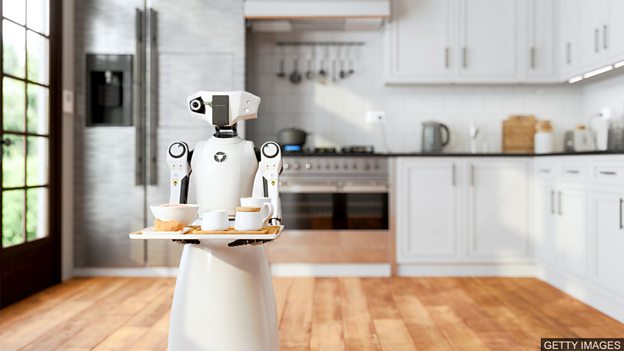隨身英語
AI in the home 家居生活智能化

人工智能技術已經被應用在我們生活的方方面面,比如自動駕駛、智能導航、聊天機器人等。我們的家居生活是否也能從中獲益?你想要人工智能 “管家” 嗎?聽 “隨身英語” 節目圍繞這一話題展開討論。
詞匯:lifestyle 生活方式
Artificial intelligence becoming self-aware and exterminating the human race is a common theme in science fiction. But the levels of high intelligence that AI could reach is a real concern among some scientists. But with more talk of AI and smart devices in the home, what are the positives of bringing these things into your life?
Hans Rosling, a professor of international health, once spoke about the impact and changes that the washing machine made. The once arduous task of cleaning clothes by hand was taken on by a machine and freed up more time for other activities. There are so many smart devices that you can fill your home with. Imagine waking up to find a piping hot, freshly brewed cup of coffee, spotless floors that have been recently vacuumed and the house set to the perfect temperature. With smart devices, these things can happen while you sleep. The potential to pre-program and automate parts of your life means that you can focus on other tasks in your life.
But there is a difference between smart devices and AI. Smart devices are the things that get on with the tasks, while AI can ‘think’ or interact, and can be used to control the smart devices. There are many voice-activated AI systems which can control the smart devices around your home. You can ask these devices to start making coffee, dim the lights when they’re too bright or even make sure the house is secure. You can inquire as to the weather outside, ask them to blare out music or search the internet for you when you have a burning question about history or the latest cooking recipes. Some of these devices even have a sense of humour, and upon asking them certain questions, they will retort. In short, in some ways, they can act as company.
But how far will it go? Well, we already have self-driving cars and sentient tech that can automatically order the delivery of certain products to restock our fridge when we’re running low, but often in films and games we see humanoid robots taking over all of the domestic duties. It seems for now, that those things only live in our imaginations, but we could be seeing them sooner than we think.
詞匯表
impact 影響
arduous 費力的
free up 騰出(時間)
piping hot 滾燙的,熱氣騰騰的
spotless 一塵不染的
vacuum 用吸塵器清掃
temperature 溫度
pre-program 預設
automate 使自動化
voice-activated 聲控的
dim 調暗
secure 安全的
blare out 大聲播放
self-driving 自動駕駛
sentient 有感應力的,智能的
restock 給(冰箱)補充食物
run low 快用完
humanoid 人形機器人
測驗與練習
1. 閱讀課文并回答問題。
1. What concerns do some scientists have about AI?
2. What was the benefit of having a washing machine, according to Hans Rosling?
3. True or False? Smart devices cannot operate while you are asleep.
4. What is the difference between smart devices and AI?
5. What sort of things can you ask AI to do?
2. 選擇意思恰當的單詞或詞組來完成下列句子。
1. He always _______ his music through the day! I can’t concentrate.
humanoid automate sentient blares out
2. The lights are so bright. Can you _______ them, please?
piping humanoid dim spotless
3. Don’t worry, I don’t need to control the wheel. This car is _______.
piping self-driving blares out automate
4. Be careful how you drink that cup of coffee. It’s _______ hot.
piping secure humanoid dim
5. We need to _______ the shelves as they are nearly empty.
sentient restock spotless piping
答案
1. 閱讀課文并回答問題。
1. What concerns do some scientists have about AI?
The levels of high intelligence that AI could reach is actually a real concern among some scientists.
2. What was the benefit of having a washing machine, according to Hans Rosling?
The once arduous task of cleaning clothes by hand was taken on by a machine and freed up more time for other activities.
3. True or False? Smart devices cannot operate while you are asleep.
False. Smart devices can operate while you are asleep.
4. What is the difference between smart devices and AI?
Smart devices are the things that get on with tasks and be pre-programmed, while AI implies a level of thinking or interaction.
5. What sort of things can you ask AI to do?
You can ask these devices to start making coffee, dim the lights when they’re too bright or even make sure you house is secure.
2. 選擇意思恰當的單詞或詞組來完成下列句子。
1. He always blares out his music through the day! I can’t concentrate.
2. The lights are so bright. Can you dim them, please?
3. Don’t worry, I don’t need to control the wheel. This car is self-driving.
4. Be careful how you drink that cup of coffee. It’s piping hot.
5. We need to restock the shelves as they are nearly empty.



